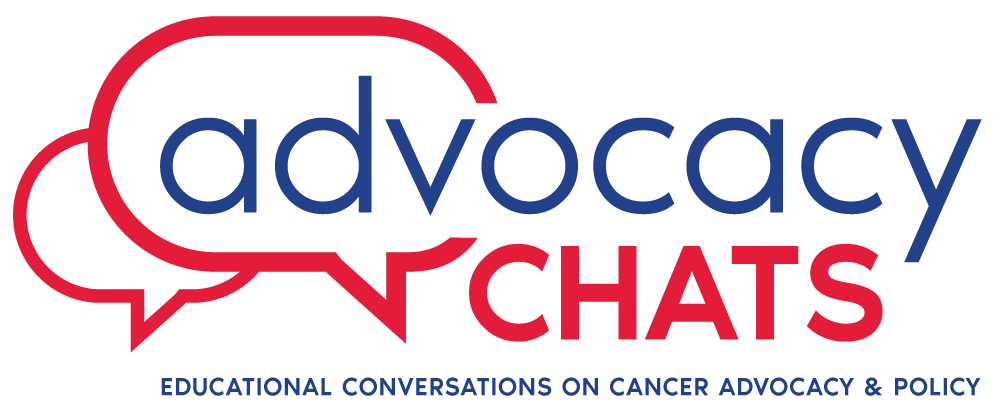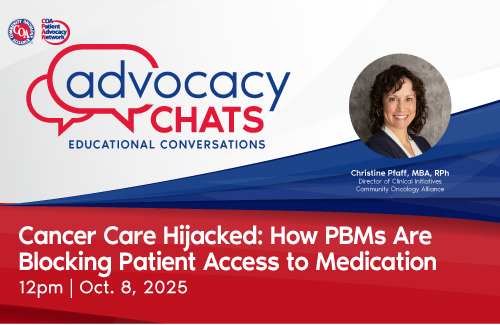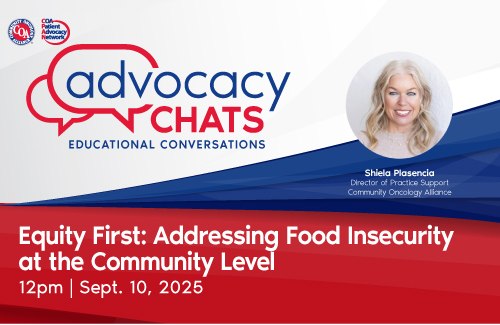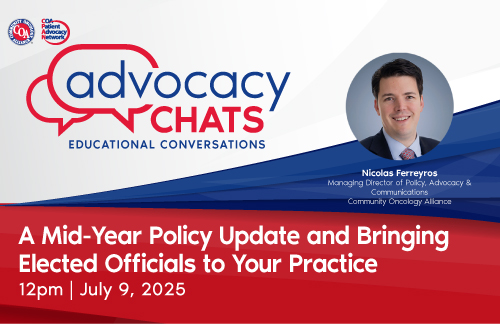The History of Cancer Survivorship
From Shadows to Life: A Biography of the Cancer Survivorship Movement
As an advocacy and educational organization, the Community Oncology Alliance Patient Advocacy Network (CPAN) focuses on national issues that affect local patient care. Rose Gerber, COA’s director of patient advocacy and education, announced that on June 8, 2022, the Federal Trade Commission (FTC) reported that it is looking into the business practices of pharmacy business managers (PBMs) and how they influence drug prices and the pharmacy business. The FTC will be looking at how PBMs negotiate drug prices on behalf of drug plans, how they decide which medications get preferential treatment, and how that affects payers, providers, and, most importantly, patients. More information will be made available on the COA and CPAN websites.
Rose also extended a thank you to CPAN Advocacy Chapter Leaders and all CPAN advocates across the country for their ongoing advocacy efforts, especially as they have kept going through the challenges of the past two years. Chapters are now back to hosting live events in their cancer centers, as well as virtual events. Most recently, chapters have hosted events on the value and importance of clinical trials as part of Clinical Trial Month, this past May.
National Cancer Survivor Month
June is National Cancer Survivor Month. This month’s CPAN Advocacy Chat guest was Judy Pearson. Judy is a triple-negative breast cancer survivor and an award-winning author. She shared her personal cancer experience, offered insight into the cancer survivorship movement, and how to change the survivorship question from “Why me?” to “What’s next?”.
Judy’s Cancer History
Ten days after her first chemotherapy treatment, Judy was showering, and a clump of hair came out. She immediately decided it was time for a head-shaving party. Judy had had a clean mammogram about two months before finding a lump. After a typical diagnostic experience, she was diagnosed with triple-negative breast cancer that her oncologist had to explain to her because, as Judy explained, “until you join the club you don’t know very much.” Her oncologist explained that her cancer was extremely aggressive, she needed to begin aggressive treatment immediately, and Judy was going to hate her by the end of treatment, but the oncologist was going to save her. Judy thought that was a good bargain.
Because she was already a published biography author, Judy was a researcher. She carefully researched her cancer, her mastectomy, and her chemotherapy drugs, but it never occurred to her to research survivorship. She did not even think survivorship was a thing. She thought that the minute treatment was over the “old” Judy would jump out of the “chemo cake.” She discovered that nothing could be further from the truth, although she has been fortunate not to have a lot of psycho-social issues associated with her cancer, which she attributes to a supportive husband, her sons, family members, and friends.
She did have many physical effects that she was not expecting. When she went back to that same oncologist, Judy told her she did not understand the night sweats, chronic fatigue, insomnia, and her joint pain. Judy’s big question was why she did not know about any of this? Her oncologist’s reply, which Judy describes as “snippy,” was that she was “busy saving Judy’s life and talking about survivorship did not seem important at the time.”
Discovering Survivorship
Taken by surprise, Judy realized she needed to begin researching survivorship. She discovered that at that time (2011), patients were rarely prepared for what survivorship means. Judy, like most cancer patients, was focused on getting rid of her cancer and figured that by the end of it all, she would be herself again. She realized that her situation was not unique.
At the same time, she started looking back on research she had done before her diagnosis, in preparation for her next book on courage, specifically women’s courage. While the book never happened, she did make two amazing discoveries. The pre-cancer Judy had spoken with a woman who was an ovarian cancer survivor. The woman spoke of things she was doing – writing a newsletter and leading support groups. Judy did not understand why she would do all that and thought she ought to be going on cruises and celebrating being alive. Post-cancer Judy understood there is great healing in helping. At the same time, Judy came across her previous research about the tremendous health benefits of volunteering.
She put together volunteering and survivorship and realized this was really a thing. Whether a cancer survivor or not, everyone reaches a point in their life and asks, “How did I get here?” We look back on the pretend footsteps in the sand and we often see that everything that happened, every step we took, lead us to the next thing. She recognized that everything she had been through, which lead her to helping, is healing. As a result, she created A 2nd Act, a local survivor organization.
Warrior Woman
Rose commented that in Judy’s pictures of her head-shaving she was smiling. Though she had a similar head shaving experience, Rose cried through hers. The lesson here is that while no way is right or wrong, every patient processes their cancer differently. Some are obvious warriors while others fight silently and privately. It is interesting to consider how a patient with cancer will react to their own illness.
Judy believes she reacted to her cancer diagnosis the way she did based upon the varying personalities of her parents. While her father was outgoing, successful, and larger than life, her mother was quieter and contemplative, yet equally as strong. Being a combination of them, Judy faced her cancer true to the old adage that, “Brits don’t cry.” She kept calm and carried on.
About two weeks after her head shaving, Judy’s son deployed to Afghanistan, so as he fought his enemy, she drew strength to fight hers. The many emails they exchanged became the “Warrior to Warrior” chapter in her book about cancer.
A Survivor Writes about the Survivorship Movement
The mission of A 2nd Act is to support all women survivors of all cancer types who are giving back to the greater good in their survivorship. This does not mean a survivor has to start an organization; giving back can just be random acts of kindness. The “what” is not important because whenever a survivor shines her energy out to the world, she takes the focus off herself, and is thereby healing.
In 2016, Judy founded A 2nd Act and was introduced to Susie Leigh, one of the founders of the National Coalition for Cancer Survivorship (NCCS). Though she had never heard of this organization, this random introduction opened the door to the material that became her next book, “From Shadows to Life.” Reviewers have said that Dr. Siddhartha Mukherjee’s book, “The Emperor of All Maladies,” is about cancer and science, and “From Shadows to Life” is about cancer and people and would be a good companion to his book. “From Shadows to Life” is a group biography and focuses on the lives of five founders. One of the highlights of Judy’s career as a professional author, the book has gone on to win a Golden Nautilus Award in 2022.
The title comes from the fact that prior to the beginning of the survivorship movement in 1986, survivors had to live in the shadows because:
- There was still a lingering fear of contagion
- Survivors, even those who have completed treatment and are in remission, could lose their jobs because employers believed they would be unreliable
- Employers were allowed to ask an employee if they had ever had cancer and, if they had, their insurance could be cancelled
Before NCCS came into existence in 1986 and began to lobby against discrimination against cancer survivors, those survivors lived in the shadows. The coalition was the first organization of its kind. At the recent American Society of Clinical Oncology annual meeting held earlier in June 2022, there were hundreds of advocacy organizations in attendance. Before 1986, there were no cancer survivor groups. There was no expectation of a cure, little expectation of remission, and cancer was still referred to as the “Big C.”
The War on Cancer
In 1971, Richard Nixon declared war on cancer by signing the National Cancer Act. At that time, only about 50% of those diagnosed with any type of cancer survived. Nixon infused $1.3 billion into cancer research. In today’s dollars that is the equivalent of more than $8 billion. Against the advice of his scientific team, he promised that the disease would be cured by the bicentennial. That money created the foundation for nearly every drug that was developed to treat cancer, some of which are still used today.
The war on cancer was focused entirely on research and a cure without any forethought on what came next. One of the co-founders of the NCCS, Dr. Fitzhugh Mullan, put it very succinctly when he said, “it is as if we have invented sophisticated techniques to save people from drowning, but once we pull them from the water, we leave them on the dock to cough and splutter on their own in the belief that we have done all we can.”
This brings up what some call the fictional five-year mark. The presumption has been that once a survivor hits five years, all is good. The truth is long-term survivors have issues well beyond five years and some have those issues for the remainder of their lives.
The National Coalition of Cancer Survivorship – The Power of Cancer Advocacy
The 26 founders of the NCCS – survivors, physicians, nurses, and others – came together over a weekend in what they called the “Continental Congress of Survivorship.” This group brought together their vast expertise and shined a light on the growing number of survivors. One of the things they said was that a patient with cancer does not become a survivor at three, five or 10 years. Those with cancer become survivors at the moment of diagnosis because that is when they begin surviving cancer.
The NCCS looked to the successes of the AIDS movement to develop the strategies and tactics for cancer survivor advocacy. The advocacy and urgency they brought to cancer survivorship allowed the cause to advance more rapidly. One of the first NCCS moves was to Washington D.C. where they situated themselves between the National Institutes of Health, where research is done, and Congress, where research is funded.
The Survivorship Journey
Many people think survivorship is a straight line from diagnosis to remission. Survivors know that is wrong. Many presume family history is an indicator of whether they will get cancer. That too is wrong. The primary indicator of cancer is aging. One in two men and one in three women either has been or will be diagnosed with cancer in their lifetime. Nonetheless there are more than 17 million cancer survivors in the United States alone. Genetics and lifestyle aside, there still is not a good handle on why some cells become malignant.
Patients are often so focused on treating cancer that they do not focus on surviving cancer. When Judy was being discharged from the hospital, a representative from a national cancer organization brought her an almost 300-page book on cancer that included only a few pages on surviving cancer. She now knows the proportions should have been reversed. Fortunately, things have changed. Not only are the books different, but now it is widely accepted that surviving cancer does not end when active treatment ends. If living is the whole point of the cancer treatment, then living as a survivor of cancer is where the focus needs to be.
Insight into
A 2nd Act focuses only on women who are survivors of cancer because women heal differently than men. This points to why Judy thinks there should be a male version of A 2nd Act.
Women heal by collaborating, communicating, and nurturing each other. The organization’s annual fundraiser is a story-telling event. Each year, an audition team selects eight women to tell their stories. The money raised allows the organization to hold quarterly “girls night out” events which are actually survivor networking. There are also workshops to help women determine for what their skills, their passion, and their cancer might have uniquely qualified them. Not all second acts need be cancer related. The point is to find something that makes the heart sing. Additional information is available at www.A2ndAct.org.
Mary Lasker – Philanthropist and Research Advocate
While writing “From Shadows to Life,” Judy was introduced to Mary Lasker. She was a philanthropist, by today’s standards a billionaire, and had one of the largest private art collections in the country, but her focus was medical research. There was none prior to her coming on the scene in 1942. She is the reason the National Institutes of Health is plural; she is the reason anyone can go to their doctor and say, “I have a lump;” she is the reason a patient with cancer can be diagnosed and referred for treatment.
Judy is authoring a book about Mary Lasker and her work. She is currently on Chapter 12 of what will be a 15-chapter book. June’s CPAN presentation was a short break before she returned to this important work.
Judy’s Surprise Birthday Gift
Judy finished her presentation by donating signed copies of her book as a birthday gift to several of the listeners who had June birthdays.
July Advocacy Chat
CPAN Advocacy Chats are regular virtual events where a guest speaker is invited to join us to discuss issues important to advocacy and advocates in a 30-minute webinar. Do not miss the July Advocacy Chat which will be on:
Wednesday, July 13, 2022
12:00 PM – 12:30 PM ET
The guest speaker will be:
Jill Pollander, RN, MSN
Vice President of Patient Services
National Organization of Rare Diseases (NORD)
CPAN Advocacy Chats are regular virtual 30-minute educational conversations about cancer advocacy and policy with a guest speaker invited to discuss issues important to patients and advocates. Summaries of previous Advocacy Chats are available on the CPAN website.
Past Advocacy Chats
